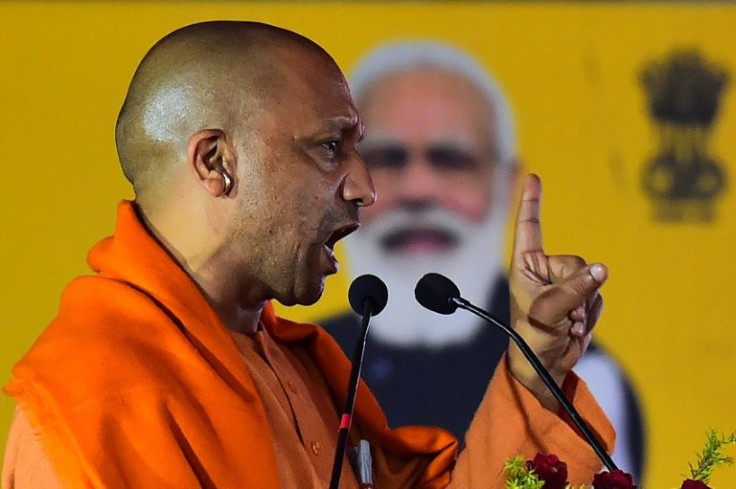Will The Modi Magic Work During Pandemic In Poll-Bound Indian States?

Religion has come to play a major role in the ongoing provincial elections in India as a mahant (monk) from Prime Minister Narendra Modi's party is seeking re-election as chief minister of a crucial provincial state in northern India.
Indeed, the fate of India's Modi government depends quite substantially on Yogi Adityanath, the mahant of Gorakhpur, securing re-election in Uttar Pradesh. So this time, communal and caste mobilizations are taking place in the poll-bound states, especially in the Hindi-speaking Uttar Pradesh, home to 237 million people.
In UP, the opposition alleges that the ruling Bharatiya Janata Party (BJP) is openly polarizing the majority votes through the politics of hate to tide over the anti-incumbency wave. The BJP faces a tough challenge in the state as farmers' protests, which lasted for more than a year, were mainly centered around it.
The devastation caused by the pandemic is an election issue in UP. Though the prime minister has tried to wash his hands and tried to pin the blame on the opposition, BJP's top leadership is worried that handling of the second wave of the pandemic, which saw dead bodies floating on the River Ganges, may not swing votes in its favor.
The opposition camp in the state, an alliance of the Samajwadi Party (SP) and the Rashtriya Lok Dal, is heavily banking on the minority Muslim votes to get into power. Lower caste people in the state, known as Dalits, are rallying behind Bahujan Samaj Party (BSP). However, BSP supremo Mayawati's opportunistic and money-making politics has destroyed the Dalit movement in the state. The BJP is banking heavily on the disgruntled elements in the Dalit movement.
Though prices of essential items have been skyrocketing since the outbreak of the pandemic, it has not become a major poll issue in any of the five poll-bound states. Maybe spreading the election into seven phases has something to do with it.
In place of the rising cost of living, the ruling BJP is showcasing expressways, international airports, mega-cities, smart cities, beautified holy pilgrimages, and even the construction of Ram Mandir (temple) as its major achievements.
In the border state of Punjab, Prime Minister Modi and his rightwing BJP are facing the electorate after the prime minister rolled back three controversial farm laws, which were aimed at the corporatization of India's mammoth agriculture sector.
Farmers from Punjab and Uttar Pradesh were at the forefront against the farm laws, introduced by the Modi government in 2020.
Punjab is a sensitive state in terms of national security and internal peace. The state has been a victim of extremism for a long time and the divisive elements are still active and ticking both in the country and abroad. This is confirmed by arrests made by police from time to time.
In the 117-member Punjab Assembly, the opposition Congress party won 77 seats, two lesser than it secured in 2012 during the 2017 elections, while BJP secured five compared to three it won in 2012.
In the northern state of Uttarkhand, Modi's party is trying to retain from the opposition Congress party, India's grand old party, to raise its standing ahead of the general elections in 2024 and the presidential election in July this year.
In the western state of Goa with a considerable Christian population where the BJP has been at the helm of the affairs, the prime minister's party is seeking another term this time.
Apart from the Congress party and the BJP in Goa, the smallest state with 40 assembly seats, other regional parties are trying their luck.
In the 2017 assembly elections, Congress party emerged as the single largest party in Goa. But defections played the spoilsport and BJP benefited from it. This time to nip defections in the bud, the Congress party has administered oath to its candidates in temples, churches, and mosques.
In Manipur, the BJP does not have a pre-poll alliance. However, the opposition Congress party has an alliance with communist parties and other regional blocks. The Congress party, which initiated liberalization in the country, is reported to be stronger than of BJP here.
Every election in India is currently being fought in the media, including social media. Here, the BJP has been far ahead of the opposition parties.
As the poll date drew closer all parties witnessed defections and there is a competitive populism on who can give what for free.
Interestingly, in the elections of five states -- Uttar Pradesh, Uttarakhand, Punjab, Goa, and Manipur -- which are being held from February 10 to March 7, no party has spoken of reviewing the neo-liberal policies, which India initiated with the liberalization of its economy in 1991.
So, these elections will have the least impact on the global financial capital and its functioning in India, Asia's third-largest economy.
However, for Modi, the stakes are high. So also for the opposition, which has been allotted a secondary role by the Modi dispensation since it came to power in India in 2014.
The BJP is hoping to prevent the opposition Congress party from forming the government in Uttarakhand, Goa, Manipur, and Punjab, to prevent it from strengthening its position ahead of the general elections two years later.
The party is banking on Modi's charisma to make it happen this time as it has done earlier.
Will the Modi magic work during the pandemic?





